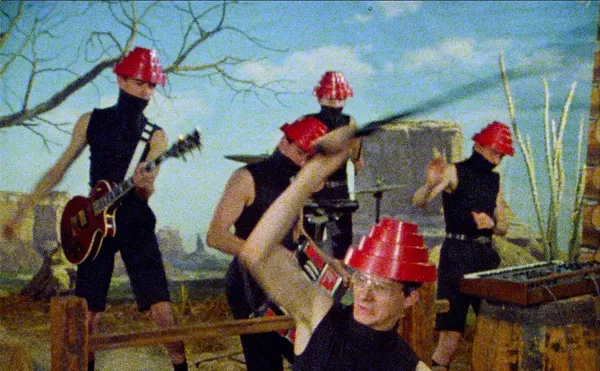There's a sublimely hilarious moment in the computer-animated hit Flushed Away where the amphibian assassin Le Frog (voiced by Jean Reno) accepts his mission with the declaration, "We leave immediately!" When his Franco-henchman queries, "What about lunch?" Le Frog announces, "We leave in five hours!"
Could this casual commitment to hedonistic sensuality be the reason our Puritan-inspired nation heaps such scorn on France? While it seems that Americans have never particularly liked the French, disdain reached an all-time high during War in Iraq Fever, when talk-radio blowhards and Republican members of Congress aimed their frothing spittle at the frogs who dared to question the United States' righteous Middle East mission.
Now that opposition to the Iraq invasion seems downright quaint, we seem to have gotten past the call for 'freedom fries' (and the lesser known 'freedom toast' decree). Perhaps it's time to put aside our Francophobia and embrace the existential ennui and suicidal hand-wringing of French cinema.
Oakland University researcher Alysa Hunton certainly thinks so. Last fall the Master of Arts grad received a small grant from the French American Cultural Exchange (FACE) to bring the Tournées French Film Festival to Oakland's campus. "OU doesn't offer foreign film programming on a regular basis and I'd like to see that change," Hunton says.
FACE works in collaboration with the French Ministry of Foreign Affairs and the French-American Cultural Fund to encourage the distribution of contemporary French films and support screenings on more than 50 college campuses around the country each year. Hunton's desire is pretty simple: "I want people, especially our students, to have an opportunity to see good quality movies they may not otherwise have the chance to see."
Sight unseen, Hunton has put together a promising selection of films that seem to highlight French cinema's reputation for emotionally confrontational cinema. "Selfishly, I wanted to see new things, so it's new for the audience and for me."
Though a few of the subtitled films scheduled made brief appearances in area theaters, the festival's docket is filled with some fresh selections new to local cinephiles. Here's a quick rundown:
La Femme de Gilles (Jan. 14)
Built around the near-silent performance of Emmanuelle Devos, Director Frédéric Fonteyne's stark melodrama about domestic betrayal will challenge American audiences with its long silences and lingering close-ups. Set in a 1930s French mining town, the film charts the desperate attempt of Elisa (Devos) to save her marriage even as her loutish husband carries on with her sister. Viewing his obsession with her sister as a disease that can be cured, her complicity is upsetting. Yet Devos convinces you that Elisa's silent determination comes from something more complex than feminist complacency. It's a carefully shaded portrait of a woman who defies easy analysis and leaves you guessing about the tragic workings of the heart.
Amen (Jan. 21)
Celebrated filmmaker Constantin Costa-Gavras (Z, Missing, Music Box) has made only one film in the United States in the last 15 years — the underwhelming Mad City — choosing to center his career on modest French projects. This high-profile production marks a return to the director's trademark blending of suspense and exposé to create a provocative political thriller.
Drawing upon Rolf Hochhuth's controversial 1963 play The Deputy and real-life accounts, the film follows SS physician Kurt Gerstein (Ulrich Tukur) and Italian Jesuit priest the Rev. Riccardo Fontana (Mathieu Kassovitz) as they struggle to inform the world of the Nazi genocide of the Jews. In particular, they attempt to gain an audience with Pope Pius XII, only to have their naive faith in human decency crushed by the biases and self-interest of the Vatican. Critics were truly divided over Costa-Gavras's confrontational approach to the material. Some applauded it for its emotional restraint while others criticized its polemic posturing. The truth is, Amen is a little bit of both ... much like the rest of the director's filmography.
Cache (Jan. 28)
Michael Haneke (The Piano Teacher, Funny Games) brilliantly examines personal and political guilt in one of the best releases of 2005 (it screened locally last winter). The film was nominated for the 2005 Golden Palm at Cannes and won Best Director for Haneke. Uncomfortable and haunting, the German director has constructed an unsolvable puzzle-box thriller that tests its audience at every turn.
A smug Parisian talk show host (Daniel Auteuil) watches his life unravel after he's sent mysterious videotapes that suggest his family is under surveillance. When references to his childhood begin to pop up, he becomes convinced that a poor Algerian is behind the campaign of psychological terror. Intellectually trying and emotionally troubling, the film is more than the paranoid whodunit it appears to be.
Abouna (Feb. 4)
Mahamat-Saleh Haroun (a Chad native educated in Paris) spins a storybook tale of two young brothers' desperate search for the father who abandoned them. The film was praised by critics for its breathtaking cinematography and harsh depiction of modern African life. Cast with nonprofessional actors and shot in authentic locations, it doesn't follow Western film conventions but rather unfolds with a haphazard combination of neo-realism and narrative simplicity. Not everyone will accept the film's sporadic flights of fantasy, but as an opportunity to experience a little-seen culture, Abouna is worth seeing.
Le Fils (Feb. 18)
Celebrated by critics and nominated for the Golden Palm at Cannes, Jean-Pierre and Luc Dardenne's unsettling drama employs the handheld immediacy of cinéma vérité to deliver a visceral emotional punch. Olivier (Olivier Gourmet), a carpentry instructor at a vocational center for troubled youth, refuses to accept a new teen into his class, but then obsessively follows the boy after school. What follows is an unexpected tale of vengeance and forgiveness. It's a rare and moving film that earned enthusiastic praise from popcorn reviewers (Roger Ebert) and highbrow critics (The New York Times' A.O. Scott and Slate's David Edelstein). For those who doubt all things French, take solace that Salon remained unconvinced of Le Fils' greatness.
All films are free and screen Sunday afternoons at 2 p.m. beginning Jan. 14, ending Feb. 18. At 124 Wilson Hall on the campus of Oakland University (2200 N. Squirrel Rd., Rochester). Call 248-364-6106 for info.
Jeff Meyers writes about film for Metro Times. Send comments to [email protected]






